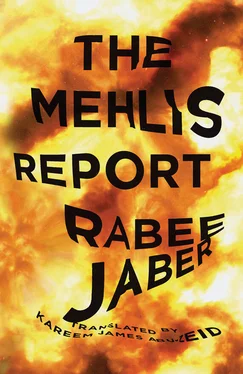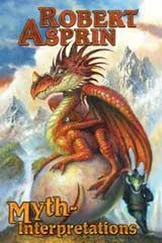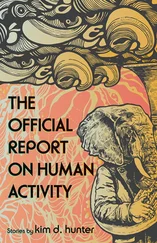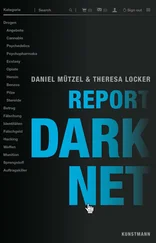“It was as if the thought left my head and made a sound. The two men jumped onto the motorcycle. I thought I was going to die when I heard its roar. No, I didn’t think I was going to die — the sudden noise seemed to kill me. As if I had been hit in the belly. I felt something explode in my body, inside my stomach, and my legs went weak. As I stretched out a hand to support myself on a tree by the fence of a nearby house, my legs gave out under me, and I fell to the edge of the sidewalk. I sat in a daze in the dirt while the sweat drenched my clothes. The motorcycle and its red taillight vanished down Al-Doumani Street, and the sweat kept streaming from my fingers and hair. My head felt like a mop, all water — water and sweat. The noise was neither a gun nor a bomb. It was a motorcycle. I stood up and wiped the sweat off my face. The silent parked car looked at me like a ghoul. Cars don’t look at people. I know that. But it wasn’t a car anymore. It was a ghoul. I’d lived through the whole war here. I’d never given up my home. We did travel abroad sometimes. But they were all short trips and we always came back. Other than the short trips, I stayed here for the entire war. Here in this house. Our door faced the door of the Riyashi house, and whenever they left we watered their trees for them, and whenever we left they watered our trees. The neighborhood’s old buildings were wiped out. They tore them down, and towers rose up in their place, but our house remained. The house remained, and so did we. We stayed here through every part of the Civil War: the Two-Year War (1975–76) didn’t drive us away; and neither did the Hundred Days’ War; even General Aoun’s war against the Syrian forces couldn’t drive us off. I was afraid, we were all afraid. But what am I saying? The fear back then was nothing compared to what I felt on that night, even though it wasn’t the noise of a shell or a bullet or a rocket or anything like that. There was no explosion. It was the popping sound of a motorcycle engine. But what a fear that was. No, it wasn’t exactly fear that I felt. I felt as if I’d been murdered. They’d killed me on my way home, while I was on the same road I’d been taking every day and every night for years and years and years, ever since I was a little boy. The road had changed a lot in those years, and I’d changed as well. But it was still the road to our house, and I was still myself. The shops had changed too, and the bakeries, and the houses. But it was still the road to our house. Yet that sound burst through the night and cut me in two. The sweat continued to ooze out of me as I looked around, my eyes clouded over — though not because of the beer and the whiskey and the wine. I had started drinking a lot recently, yes, and mixing my drinks. I no longer drank just one kind of alcohol at one sitting. It wasn’t the right way to drink. I never used to drink like that. But it was chance. Before, I used to pay attention, and never let chance dictate my actions. But I had stopped paying attention. It was as if my will were no longer my own. And that white man with blond hair, Mehlis — he was keeping quiet. How long would he stay silent? At first they said until October 21, and then until October 25, and now they’re saying until December. What is this? Are they waiting until every living soul is gone from Beirut? How long will they wait? Don’t they know the truth yet? What’s this truth that can never be told? People are dying while the truth holds its tongue.
“But that night I was all by myself in Achrafieh, the streetlights were shining down on the garbage bins, and I wasn’t thinking about the people who were dying. Or rather: I was thinking about them, and I wasn’t. I stood up and started moving. Slowly, like a slug, like a turtle. As if I were learning to walk there and then. As if I were walking for the first time in my life. I lifted a foot and moved forward. I stopped moving forward — I had to lift the other foot now. I lifted it and moved forward again. One step after the other. I emerged from the darkness into the glow of the streetlights. I felt like I was in an orange grove. But this was no orchard. I could hear my bones rattling. The sweat had stopped flowing now, but my skin was drenched, as if I’d just come out of the sea. My skin felt like a pillow filled with bones, bones that rattled as I moved forward, toward the intersection, toward the street corner, toward my home. How many years had I been taking this road? I’d walked it with a backpack in my school days. Yet on that night I was walking it for the first time. What was this silence? Where were the neighbors? Where were the people of the city? Had they all died? Had they left the city? Where were they? I could hear TVs, and I could see the blue lights of the screens flickering through high balcony doors and half-shuttered windows. I could hear them, and I could smell food somewhere, and I could see dark movements through the windows. But it was as if I were seeing things in another world. And the car — behind my back now — was it still a ghoul staring at me? Would I cover these few feet and survive? Or was it my time to die? Would the ghoul explode and splatter me all over the street, onto the walls and the tree-lined fence of Kourani’s house? Was I going to die? I’ve got to move quicker, to cover this distance, these few feet. But my body was not my own, not anymore. I’d lost it in a moment of distraction. It was as if I’d left it behind, had begun to rise, to hover above it like a bird, near the tops of the pine trees. From up there I could see it moving forward like a cripple: one step, then another, and then another still. My pace was so slow. My muscles had turned to wood, and my joints could no longer bend. It was as if I’d lost them: bone was still connected to bone, but without any joints now. And joints are necessary for movement. Joints and the lipid matter between them. There’s horrible pain if the oil between the joints dries up. Aspirin can’t cure you then, nor can hospitals. My bones had crossed into each other, and so I moved forward like a tree trying to walk. And the whole time I could feel the car behind my back: silent, horrifying, dangerous, cold. Where was everyone? It wasn’t even midnight yet. No one was on the street. Everyone was inside their homes! Didn’t anyone on Monot Street stay up late? Where was everyone? They’d left me alone with this car.
“Once I was inside the house (past the wrought iron gate and the courtyard) and had locked the front door behind me, I thought I was saved. But I wasn’t entirely sure yet. First of all, I was still worried about the dark Mercedes. Second, I felt some pain between my ribs, and in my arms, and some light pain under my left breast. Maybe I was saved — I wasn’t sure.
“In the kitchen I drank some water and washed my face. And the electric light above the sink suddenly filled me with a strange sensation: I was no longer afraid. Suddenly — I don’t know how — the fear left my body. The blood was still beating furiously in my neck, through the artery there, but I was no longer filled with fear. The movement of the man as he emerged from behind the bins came back to me. Then his face came back — I had seen the side of it — and then his voice. He wasn’t a bad man. His voice was normal. Maybe he’d gotten off the motorcycle to piss on the iron bars, imitating all the neighborhood dogs. He’d gotten off and pissed at the edge of the abandoned plot of land, then climbed back onto the bike with his friend. And maybe his friend had also taken a piss. How should I know?
“These thoughts quickly crossed my mind, then vanished. And the fear came back in a single treacherous surge — I again thought the car would explode at any moment. The hair stood up on my neck and my back froze. I felt covered in ice. The car was going to explode. But I didn’t hear anything. Just the sounds of TVs piercing the walls in the city night. And cars passing in the distance: a car driving through Abd al-Wahab al-Inglizi Street, a car parking on Monot. The cars on Monot sounded different ever since they removed the asphalt and paved the street with black stones. The wheels were louder now, passing over the gaps between the stones — the noise rose and resounded through the night. The important thing was that the car hadn’t exploded. And that I was still alive.
Читать дальше












